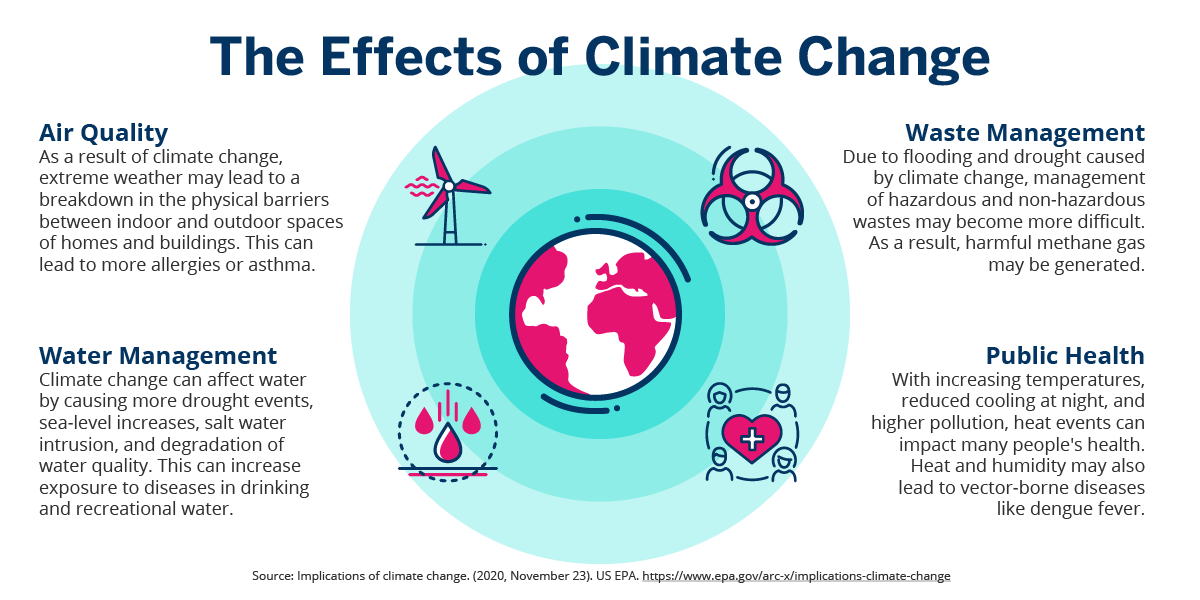How the Tech Community is Combating Climate Change + Free Environmentally Friendly Resources and GitHub Projects

According to an article from Time magazine, 2020 was the year of climate extremes. Numerous research studies have shown that many of the natural events that occurred in 2020 would not have happened, or happened to the same severity, without the warming of the planet. These changes include increasing temperatures, extreme weather events, the displacement of wildlife populations, rising sea levels, and more.
Although climate change is a large and complex problem, the tech sector is taking some steps to help make the industry more climate-friendly. For example, there is a growing trend to make technology and software more “carbon-efficient,” which takes into account energy efficiency factors and results in fewer carbon emissions released per unit of work.
Throughout this article, you will gain a greater understanding of climate change and its effects and learn how the tech community is fighting climate change through carbon-efficient, green digital, and software solutions. We will conclude by sharing a list of technology resources you can use to take action, including GitHub projects, libraries, APIs, open data sets, and more.
What Is Climate Change and What Are the Implications?
The term climate change refers to an alteration in weather patterns and temperatures over time. Much of the rapid warming of our planet can be explained by greenhouse gas emissions and other human activities, which already have a noticeable and negative effect on our environment. Due to rising global temperatures linked to climate change, glaciers and ice sheets in polar regions are melting at an accelerated rate, resulting in rising sea levels in various parts of the world. Rising ocean temperatures have also increased flooding and erosion along coastlines as a result of rising sea levels.
Here are some of the implications of these climate change effects, as outlined by the United States Environmental Protection Agency.

How the Tech Community Is Combating Climate Change
The open-source tech community may drive and fuel the development and growth of a clean-based human ecosystem for a sustainable future, as revealed by a recent article entitled The Open-Source Solution to Combat Climate Change. According to the author, Dr. Michael Heng, open-source technology innovation allows collaboration across a wide range of open technical knowledge and applications to produce a network of change-makers with a single objective: Overcome climate change by utilizing renewable energy and introducing radical lifestyle changes.
Open-source technology leaders like IBM have recognized the potential for combating climate change, recently urging developers from around the world to build innovative, open-source systems. A key objective of their project is to maximize the global impact of open-source technology in communities by using it in new and innovative ways.
Examples of Environmental Open-Source Use Cases
- Eco Stats Perú: Using open source data, this website illustrates how climate change has affected Peru. The owners hope to list solutions and present data that raises awareness about how Peruvians impact the environment, its resources, and climate change.
- electricityMap: This tool offers real-time visualization of electricity consumption and resulting CO2 emissions. Since 2016, electricityMap’s open-source visualization has been used by millions of people, from students to world leaders, to understand the climate impact of global electricity use.
- Trends.Earth: This is an open-source tool platform from Conservation International for monitoring land change using earth observations in an innovative desktop and cloud-based system.
- PV_ICE: The Photovoltaics in Circular Economy tool (PV ICE) is a open-source tool that helps quantify and assign a value framework to efforts on re-design, reduction, replacement, reusage, recycling, lifetime, and reliability increases on PV; implementing Circular Economy metrics for PV materials.
- Pysolar: Founded by Brandon Stafford, a solar industry professional-turned-engineer, this is a collection of Python libraries for simulating the irradiation of any point on earth by the sun. It includes code for extremely precise celestial object calculations (e.g., future locations of celestial bodies).
Tech and Data Resources to Help Combat Climate Change
There is no doubt that the tech community plays a significant role in reducing the implications of climate change. Below is a list of GitHub projects, libraries, APIs, open data sets, and more to help you learn about technology and climate change and what you can do to help.
Contribute to These Climate Change GitHub Projects, Libraries, and Repositories
GitHub projects, libraries, and repositories can be a great way to gain experience in new programming languages, databases, or operating systems. Contributing to something as important as climate change reduction provides an opportunity to make an impact. Here are a few options to help you get started.
- Sustainable-Earth: Explore a curated list of all things sustainable. This list is divided into categories such as books, companies, apps, and movies.
- Awesome-earth: Wondering what you can do about climate change? Here is a list of 326 things you can do.
- Awesome-clean-tech: Browse a community-curated list of clean-tech companies to follow.
- Treecounter-app: This app allows you to plant trees with over 100 reforestation projects around the world.
- ClimateChangeProjections: This embeddable map shows climate change projections around the world.
- Machine-Learning-for-Solar-Energy-Prediction: Determine the energy production of solar farms based on weather measurements.
- Solcore5: Learn how to model solar cells and semiconductor materials using a multi-scale Python library.
- solar-panel-detection: By combining artificial intelligence (AI) with open data and short-term forecasting, this project identifies solar energy production.
- OpenOA: OpenOA provides a framework for interacting with large time-series data sets from wind farms, such as SCADA data.
- pyCity: This Python tool can be used to generate city energy systems and city districts scenarios.
- TopFarm2: This library is designed by DTU Wind Energy to allow wind-farm optimization using Python.
- BasicDTUController: This project aims at providing the wind energy community with a free, open-source wind energy controller.
- AirfoilPreppy: Using Python, analyze data on aerodynamic airfoils, especially focusing on windmills.
- GreenGuard: Explore an integrated set of solutions to machine learning problems commonly encountered in monitoring wind power plants.
- StorageVET: This analysis tool can evaluate energy storage technologies, as well as other energy sources paired with storage.
- NYCBuildingEnergyUse: Calculate the amount of greenhouse gases an individual building emits based on its age, water use, and energy use.
- eplusr: Make use of a powerful toolkit in R to directly explore the whole building energy simulation program EnergyPlus.
- EVNotify: Monitor the charge level of your electric vehicle and receive alerts when preset levels are reached.
- emobpy: Use this Python tool to create profiles for battery-powered electric vehicles.
- Antares Simulator: This open-source tool can help analyze the adequacy of interconnected energy systems over short or long periods of time.
Free Online Resources for Checking Your Carbon Footprint
Carbon footprints in the United States are among the highest in the world. The average American generates 16 tons of CO2 a year — mainly through food, transportation, and housing. Here is a list of tools to help you determine your carbon footprint.
- Carbon-Footprint: Calculate your carbon footprint from food, transport, fashion, electricity, and digital activities like streaming, crypto art, or blockchain.
- Carbon Calculator Tools, Software, and Support: This tool can help raise awareness, measure emissions, reduce costs, and engage staff in carbon management.
- Footprint Calculator: Take a few minutes to learn about how your personal choices influence your carbon footprint.
- How Green is Your Company (Questionnaire): This questionnaire can help you determine if your company is environmentally friendly.
- Carbon Footprint Calculator: Explore a free carbon footprint calculator for individuals and households.
- How Eco-friendly Are You?: Do you think you are eco-friendly? Take this test to find out!
- Machine Learning CO2 Impact Calculator: Did you know machine learning has a carbon footprint? These website owners have made a tool to help you estimate yours.
Apps to Help You Reduce Your Carbon Footprint
Your carbon footprint is affected by many factors, including how you heat your house, how you travel to work, and the amount of trash you dispose of. Taking steps to reduce your carbon footprint is a good start to combating climate change. Here are a few resources to help you get started.
- Oroeco: See which choices really matter, save money and earn rewards, and inspire your community to be part of a collective solution to global warming!
- Bikemap app: Plan, record, and navigate routes worldwide. Developed by cyclists for cyclists, Bikemap assists you with turn-by-turn voice instructions, showing your current position, all cycling paths, and relevant points of interest on the map.
- Ecosia: This is a not-for-profit search engine which uses ad-generated revenue to fund the planting of trees.
- Zero Carbon: This advanced,extensive, all-in-one solar app enables end users to access, record, and analyze units of electricity produced, forecast weather details, and more.
- offCents: This application lets you automatically detect, calculate, and offset your Carbon Dioxide (CO2) emissions from travel.
Free Resources for Assessing the Greenness of Your Software
The way a piece of software consumes or emits energy comes from the way software is designed and used. Fortunately, this impact can now be measured. Below, you’ll find resources to help you start assessing your software purchases and usage.
- How Green Is Your Software?: This article by Harvard Business Review can help you determine the greenness of your software.
- Green and Sustainability in Software Development Lifecycle Process: This article gives insight into the GREENSOFT Model for sustainable software engineering.
- Green Coding: Sustainability in Software: Learn what it means to write green code in this article by Who’s Saving the Planet?
List of Free APIs on Climate Change
Application Programming Interfaces (APIs) allow data and functionality to be exchanged between two different software systems. When it comes to climate change, APIs are used for everything from fetching traffic data to tracking air pollution levels. Here are some other interesting applications.
- Degree Days API: The Degree Days.net API makes it easy to automate the process of fetching weather data to help with energy saving.
- Air Quality Index API: The map API can be used to show the real-time Air Quality Index on Google, Bing, or Open Street maps.
- BreezoMeter API: This API can help you track traffic, weather, satellites, meteorological data, land cover information, and more.
- Clean Power Research API: These energy APIs are designed to bring the industry’s trusted data sets and insights to your apps.
- OpenWeatherMap API: Access current weather data for any location, including over 200,000 cities.
- NASApower: Automates the process of downloading global meteorology, surface solar energy, and climatology data from NASA-POWER into your R session.
- The National Renewable Energy Laboratory: The National Renewable Energy Laboratory’s developer network helps developers access and use energy data via web services, including renewable energy and alternative fuel data.
- Planet OS API: Discover and access data from the fastest-growing data catalog of weather, climate, and environmental data.
The inclusion of these resources is for educational purposes only and does not constitute an endorsement by UT Austin Boot Camps.

 Live Chat
Live Chat